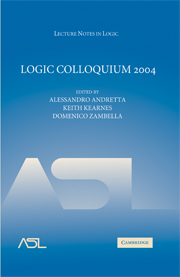Book contents
- Frontmatter
- Contents
- Introduction
- Speakers and Titles
- Abstract elementary classes: some answers, more questions
- On the density of Hausdorff ultrafilters
- Zero-groups and maximal tori
- Constructive set theory with operations
- Parametrized local zeta functions
- Colourings of hypergraphs, permutation groups and CSP's
- Tolerance intersection properties and subalgebras of squares
- Universes in type theory part I—Inaccessibles and Mahlo
- Hausdorff-dimension and weak truth-table reducibility
- Computation and the explanation of intelligent behaviours: ethologically motivated restart
- Constructible sheaves and definability
- An overview of modern universal algebra
- Lecture Notes in Logic
On the density of Hausdorff ultrafilters
Published online by Cambridge University Press: 05 July 2014
- Frontmatter
- Contents
- Introduction
- Speakers and Titles
- Abstract elementary classes: some answers, more questions
- On the density of Hausdorff ultrafilters
- Zero-groups and maximal tori
- Constructive set theory with operations
- Parametrized local zeta functions
- Colourings of hypergraphs, permutation groups and CSP's
- Tolerance intersection properties and subalgebras of squares
- Universes in type theory part I—Inaccessibles and Mahlo
- Hausdorff-dimension and weak truth-table reducibility
- Computation and the explanation of intelligent behaviours: ethologically motivated restart
- Constructible sheaves and definability
- An overview of modern universal algebra
- Lecture Notes in Logic
Summary
Abstract. An ultrafilter U is Hausdorff if for any two functions f, g ∈ ωω, f(U) = g(U) iff f↾X = g↾X for some X ∈ U. We will show that the statement that Hausdorff ultrafilters are dense in the Rudin-Keisler order is independent of ZFC.
Introduction. For f ∈ ωω and an ultrafilter U on ω define f(U) = {X ⊆ ω: f−1(X) ∈ U}, and for f, g ∈ ωω we say that f = g mod U if there is X ∈ U such that f(n) = g(n) for n ∈ X.
We say that U is Hausdorff if for any two functions f, g ∈ ωω, if f(U) = g(U) then f = g mod U.
Let FtO be the collection of all finite-to-one functions f ∈ ωω. Recall that an ultrafilter U is a p-point if for every function f ∈ ωω either there is n such that f−1({n}) ∈ U or there exists g ∈ FtO such that f = g mod U. Similarly, U is Ramsey if for every function f ∈ ωω either there is n such that f−1({n}) ∈ U or there exists a one-to-one function g ∈ ωω such that f = g mod U.
In this paper we will assume that all ultrafilters U, and their images f(U) are non-principal.
It is worth mentioning that the following appears as an exercise in [7]. If f(U) = U then f = id mod U. Therefore, if U is not Hausdorff, then this is witnessed by two functions, both not one-to-one mod U. It follows from it that Ramsey ultrafilters are Hausdorff.
- Type
- Chapter
- Information
- Logic Colloquium 2004 , pp. 18 - 32Publisher: Cambridge University PressPrint publication year: 2007
- 1
- Cited by



